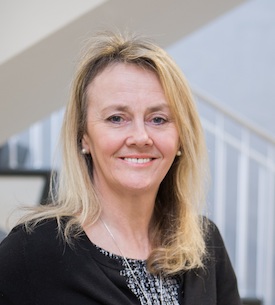Closing date: 07/03/2025
MB-PhD Project: Immunomodulation in multiple myeloma
Lead Supervisors: Prof. Caroline Dive – Contact Co-Supervisor Dr Millrine with queries using his named link below
Co-Supervisors: Dr David Millrine; Dr Emma Searle
Applications Deadline: Friday 7th March 2025
Project Keywords: Myeloma, Immunology, Biomarkers
Research Opportunity: Intercalated PhD, leading to the award of PhD and MBChB
Project Outline
Multiple myeloma is a devastating B-cell malignancy for which there is no cure. The development of immunomodulatory drugs (IMiDs) has proved transformative to multiple myeloma care, however, their remain unanswered questions related to the mechanism of action of this important drug class. Key among these, it is currently uncertain whether modulation of the immune system contributes to IMiD efficacy in multiple myeloma. Instead, this is thought to occur via cancer-intrinsic processes.
This project will apply flow cytometric analysis to elucidate contributions of the immune system to the IMiD mechanism of action in multiple myeloma and by extension, identify biomarkers of IMiD response. There will be opportunities to answer key questions related to the therapeutic efficacy of IMiDs when used in combination with other frontline therapies including immunotherapy and proteasome inhibition.
Unresolved questions include:
- Does the immune system contribute to the efficacy of IMiDs in multiple myeloma?
- Why do IMiDs show synergy with proteasome inhibitors?
- How do these properties intersect with emerging immunotherapies?
In parallel, the CRUK Cancer Biomarker Centre (CBC), in collaboration with an industry partner and Consultant Haematologist Dr Emma Searle (the student’s clinical mentor) is embarking on a major program of research that seeks to improve patient outcomes in multiple myeloma through the identification of early-stage biomarkers. The MB-PhD fellow will be integrated with an established team of CBC-based immunologists who are pioneering immune-oncology biomarkers across a spectrum of cancers. They will work closely with collaborators at The NHS Christie Foundation Haematological Treatment Unit (HTU) where access to leading clinicians enables outstanding translational science ground in patient derived (physiological) samples. Emerging from this program of research the fellow will be fully versed in cutting edge translational science and competent to lead research programs in the immune-oncology field.
About Prof. Caroline Dive (project Lead Supervisor)
Upon completing her PhD studies in Cambridge, Professor Caroline Dive moved to Aston University’s School of Pharmaceutical Sciences in Birmingham where she established her own group studying mechanisms of drug induced tumour cell death, before moving to The University of Manchester to continue this research. Caroline was awarded a Lister Institute of Preventative Medicine Research Fellowship before joining the Cancer Research UK Manchester Institute (CRUK MI) in 2003.
Currently, she is Interim Director of the Institute and Director of its Cancer Biomarker Centre, with research spanning tumour biology, biomarker discovery and preclinical pharmacology alongside regulated laboratories for biomarker assay validation and qualification within clinical trials to Good Clinical Practice standards supporting clinical decision-making.

About the lab group
Find out more about the lab group involved in this project and how we support your wellbeing, learning and career development.

CBC is a welcoming environment, where basic, translational and clinical scientists work in tandem with mutual respect. CBC students are embedded in a supportive network of integrated teams with day-to-day supervision by team leads and deputies. We have 3 clinical fellows and 9 students currently.
My goal is to support the student in their journey potentially towards research independence, equipping them with laboratory skills, research acumen and confidence. We seek to transfer fundamental tenants of a successful research career to ensure the long-term career success.
All students provide presentations within lab meetings on a regular basis to engage with their laboratory group. For formal supervisor meetings, students should be able to discuss and show understanding of their project to a high level, with the meetings designed primarily to support and give constructive advice to the student.
CBC laboratory facilities in the new Paterson building are well-equipped with all necessary equipment and space for this project.
I expect the student to develop deep expertise in multiple myeloma biology and therapeutics, maintain highest levels of research excellence and integrity and with practice support, present their findings internally and externally where the opportunity arises.
They will have opportunities to network and build their reputation, expanding opportunities for future career development with access to the extensive research network of the CBC Director that includes globally renowned scientists and clinicians.
The supervisory team is committed to ensuring project success and will calibrate laboratory mentorship to student capabilities alongside their clinical mentorship from Dr Searle.
Good mental health supports a successful research career. The translational immunology team enjoys an excellent work-life balance whilst maintaining the utmost scientific excellence evidenced by the international reputation of the CBC.
Key information
Find answers to some common questions about our MB-PhD Studentships.
To apply to intercalate onto the PhD in Cancer Sciences component of the MB-PhD, you must meet the below criteria and satisfy the general requirements for permission to intercalate set by your institution, including passing all components of the MBChB at first attempt in the year prior to intercalation.
A University of Manchester MBChB student
- holding a BSc (hons) 2.1 or above in a relevant subject and in year 2 or year 3 of the MBChB or year 1 or year 2 of GEM; or
- currently studying in year 3 of the MBChB or year 2 of GEM
A University of St Andrews Medicine BSc (Hons) student on the Manchester course pathway:
- holding or predicted a BSc (hons) 2.1 or above and be intending to intercalate straight onto the MB-PhD ahead of your arrival in Manchester or by no later than between year 3 and year 4 of the Manchester MBChB programme
A University of Leeds MBChB student:
- currently studying in year 3 of the MB ChB
International applicants (including EU nationals) must ensure they meet the relevant academic eligibility criteria (including English Language).
The PhD component of the MB-PhD studentship is usually funded for three years, or four years in exceptional circumstances with prior agreement of MB-PhD Committee and supervisory team.
The studentship covers:
- An annual stipend of £21,000 per year to help with living costs
- Full funding for your PhD tuition fees (at the UK rate, with fee bursaries available for high-performing EU/International candidates)
- PhD project consumables and running costs, including costs for researcher development such as conferences and travel
- MBChB tuition fees (at the UK rate) for a maximum of four years
Here are our quick steps to apply for our MB-PhD:
1. Eligibility
First, you need to check you are eligible to apply for an MB-PhD. Please see the eligibility tab (above) to read all criteria.
2. Contact supervisors
You can explore the range of MB-PhD opportunities that are open to application on our Research Opportunities webpage.
We encourage you to contact the supervisor of any MB-PhD projects that you are interested in before starting your application. Having these conversations will help you to get a feel for the different research themes and projects on offer.
3. Register
Register to apply for our MB-PhD opportunities using the Postgraduate Application Form. You must create an account to register.
4. Create a new application
When you create a new application make sure you select the following:
- Academic Career – Postgraduate Research
- Mode of Attendance – Full-time
- Program Description – search for MB-PhD and then select the MB-PhD Programme
- Candidates apply for the MB-PhD programme – under ‘Research Title’ list MB-PhD Programme. You can provide supervisor preferences/research interests in your accompanying supporting statement and these will be considered at and after interview
- If you are shortlisted, you’ll be interviewed by the MB-PhD Programme Directors and Education Committee before being accepted onto the programme “in principle”. You will be matched with a supervisor based on your interview performance and project/research preferences
- If successful at interview, you will be asked to meet with a nominated MB-PhD supervisor in the subsequent week for them to review and approve your PhD offer
- For funding sources, please include the following information:
– Select ‘Yes’ from the drop-down
– Type of Funding: University of Manchester Scholarship
– Awarding Body: Cancer Research UK MB-PhD
– Status of Funding – Awarded
– Funding Covers – Fully Funded
– Leave the remaining boxes blank
5. Supporting documents
Your application form must be accompanied by several supporting documents:
CV
This should include:
- qualifications (GCSE, A-level or equivalent, and any higher education qualifications, including grades, and your current programme)
- academic prizes, research projects, and academics interests
- extracurricular interests, and activities and positions of responsibility relevant to your application
The information you provide in your CV will be considered in relation to widening participation, and/or university access policies, to ensure that all applicants are treated fairly.
Supporting statements
This should be 1,000 words maximum and include your reason for applying to the MB-PhD programme and your interest and suitability for the project. You can include project/research interest/s here and these will be considered at and post-interview.
References
You need to list two referees, one of which must be an academic referee from The University of Manchester, The University of Leeds or The University of St Andrews-Manchester pathway MBChB programme.
This could be a:
- Clinical debrief tutor
- PEP tutor
- Literature research project supervisor
- PPD tutor
References cannot be submitted by a supervisor named on the project you are applying for.
Supporting documents can be uploaded and submitted with the online application form.
If you have any issues, your supporting documents can be sent directly to the Doctoral Academy Admissions Team at admissions.doctoralacademy@manchester.ac.uk, CC’ing in mcrctraining@manchester.ac.uk.
6. Acknowledgement and review process
Once you have submitted your application form, we will email you with an acknowledgement.
We will review your application after the application deadline and once we’ve received all your supporting documents. If successful at interview, we will also share your application with a nominated supervisor(s) to review.
7. Interviews
We will email you if you are invited to interview.
Interviews will take place at the Oglesby Cancer Research Building in Withington in Spring 2025.
Applying to intercalate
UoM MBChB students must complete an intercalation Expression of Interest form by Friday 24th January 2025 (we may be able to consider late applications to intercalate in exceptional circumstances). This form is available on 1MedForms via the following link: https://www.onemedforms.manchester.ac.uk/
UoL MBChB must apply to intercalate via UoL processes by Friday 24th January 2025.
University of St Andrews Manchester pathway students can contact mcrctraining@manchester.ac.uk for guidance.
Key dates
- Intercalation deadline: Friday 24th January 2025
- Application deadline: Friday 7th March 2025
- Interviews: w/c 28th April 2025
- Start date: September 2025
Useful Links
MB-PhD Studentships
Find out more about our MB-PhD Studentships which allow you to study a fully-funded PhD alongside your medical degree.
Get in Touch
Contact Dr Georgina Binnie-Wright, Postgraduate Programme Manager.
A Day in the Life of an MCRC MB-PhD Student
Watch our short video to see what it's like to be an MB-PhD student in Manchester.
Researcher Stories
Read first-hand experiences of from cancer scientists from across Manchester.
Why Manchester?
Find out why postgraduate students choose to study in Manchester.





